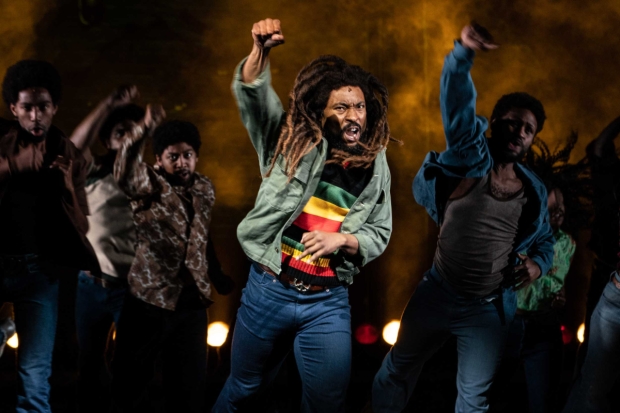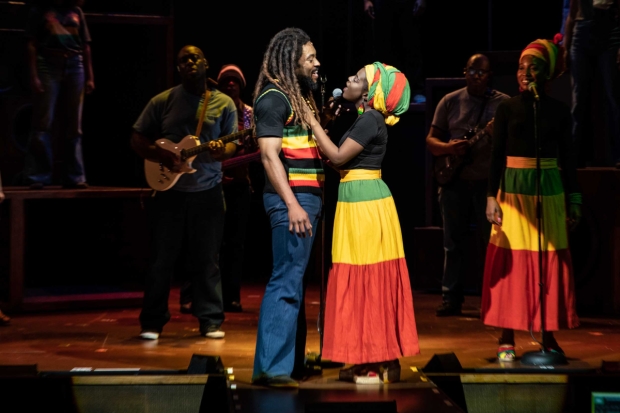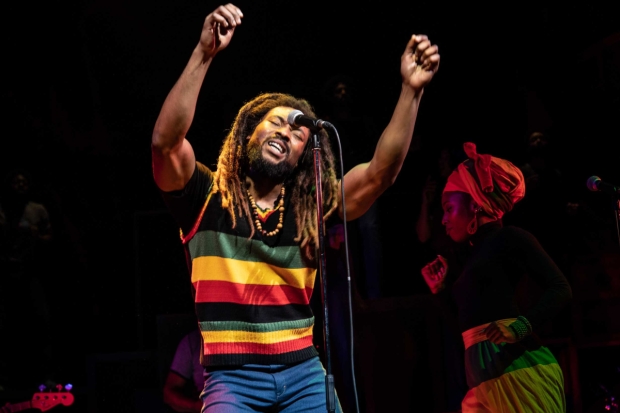Get Up, Stand Up! The Bob Marley Musical review – reggae rocks the West End
The show is playing now at the Lyric Theatre

© Craig Sugden
Bob Marley's life, from his part in conceiving the reggae movement to his conceiving many children with many partners, has been on stage three times in the last decade: Kwame Kwei-Armah's Marley had a fleet life in Baltimore in 2015 before, rechristened as One Love, a newer take was presented at the Birmingham Rep in 2017. After many pandemic-induced stops and starts, this latest piece, directed by Clint Dyer alongside book writer Lee Hall, has arrived with an endearing if uneven blast of energy that will likely delight Marley fans no end.
Hall, who has struck gold with the electrifying Billy Elliot and riotous Our Ladies of Perpetual Succour, is on far less sturdy form here: he tells Marley's life story like a jockey swapping records with reckless abandon, hopping from scenes exploring Marley's artistic drive to political moments in Jamaican history that, without emotional grounding, feel more rote than rousing. There isn't really a cohesive through-line tying it all together.
The same is true when Hall chimes in on Marley's romantic life – a myriad of amorous affairs and (for the most part, unseen) sired children. The Rasta's relationship with global superstar Cindy Breakspeare (an under-used yet note-perfect Shanay Holmes) feels rushed, while his wife Rita (Gabrielle Brooks, more on her below) disappears into the periphery for a large portion of the show before returning for what could, if treated properly, have been a moment of catharsis.
The experience isn't helped by Chloe Lamford's set – supersized speakers and amplifiers littered across the stage – which provide a nice sense of vertical movement, but accomplish little else beyond that. Tal Yarden's video design, thankfully, goes some way towards making the show more visually arresting, aided by Charles Balfour's versatile lighting.
Dyer adds some neat touches – a pre-show passage involving a box-occupying DJ starts the piece with a playful, refreshingly irreverent note – but generally it's when the production lets Marley's words and messages speak for themselves that everything really begins to gel: "Redemption Song", in particular, with a tight beam focussed on leading man Arinzé Kene, is one of the few moments of outright pertinence on offer.

© Craig Sugden
Disaster comes mere seconds later however: as the audience start to clamber to their feet for a spontaneous standing ovation, Hall has Marley's incessant health problems cut his moment of triumph short as the musician collapses: the Lyric Theatre's spectators, suddenly missing key moments of dialogue amongst the applause, have to shuffle back down to their seats as the play rattles on.
Without an overt emotional connection, the performers themselves have to work hard to earn the audience adulation. Thankfully – this is where they succeed in spades (kudos to casting director Pippa Ailon): Kene is the whirlwind at the heart of a geopolitical and musical melange – giving a nuanced, studied, sweaty turn that deserves all the critical and audience praise it will receive. A capable performer playing a capable performer, you can almost feel Kene's fondness for his subject ripple across the auditorium in what is a refined and multi-faceted interpretation of an icon.

© Craig Sugden
He's helped, when she's finally given a couple of chances to shine in the second act, by Brooks as Rita: a powerhouse in J'Ouvert earlier this year, she brings the house down with "No Woman, No Cry". But she, like so many others around Bob, feel unhelpfully underserved.
A closing montage of projected clips, reflecting on how aspects of Marley's life still strike a chord with present-day issues, highlights how far the book really dropped the ball. From the climate crisis, rampant racist vernacular, exploitation of Black and mixed-race talent for the profit of white producers and questions around pan-African identity, there is so much that could have been said, on top of what was sung.
So come for the performances – especially the final 15-minutes of non-stop hits – which definitely provides a reason to get up, stand up and dance the night away.












